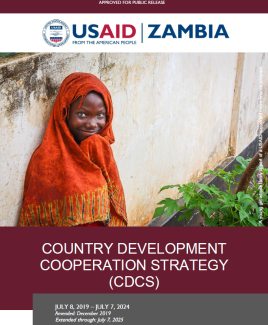USAID/Zambia Country Development Cooperation Strategy,
Extended Through 2025
I. EXECUTIVE SUMMARY
Motivated by USAID’s Transformation, and building on previous successes and lessons learned, USAID/Zambia has developed a new 2019 – 2024 Country Development Cooperation Strategy (CDCS), to take effect in July, 2019, that aims to advance Zambia’s journey to self-reliance (J2SR) and make progress toward the ultimate objective of ending Zambia’s need for development assistance. The CDCS goal statement is: USAID will partner with the Zambian government, civil society and private sector to advance the country’s self-reliance through more effective development choices and governance, enterprise-driven economic growth, and increased resilience among its vulnerable citizens.
This strategy seeks to unleash private sector investment and build local capacity to advance an alternative development path which generates solutions that are sustainable and do not mortgage the country’s future development potential and sovereignty. The strategy does not anticipate that Zambia will no longer need foreign assistance by the end of the CDCS implementation period. However, it establishes a vision for how to achieve self-reliance at household and national levels, and starts down this path through transformative and sustainable gains in: (1) effective, citizen-responsive governance; (2) rural poverty reduction and sustainable natural resource management; (3) utilization of quality health, water and sanitation, and social protection services; and (4) primary education quality.
Zambia’s Country Roadmap indicates a country that is relatively low in Capacity, but relatively high in Commitment. It specifically highlights three priority concerns that are the focus areas of this CDCS -- Open and Accountable Governance; Citizen Capacity; and Capacity of the Economy. The CDCS will also focus on changing aspects of Economic Policy which currently contribute to weak citizen and economy capacity.

